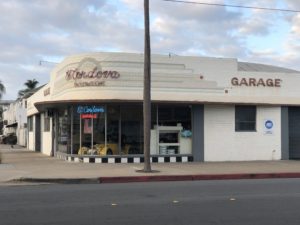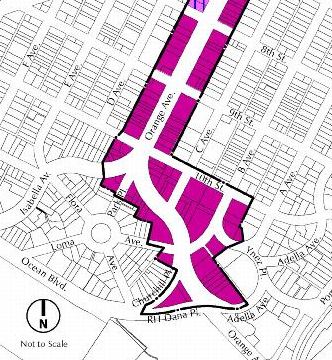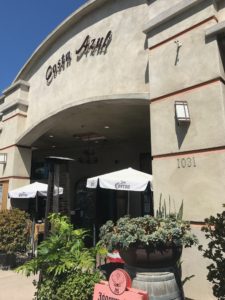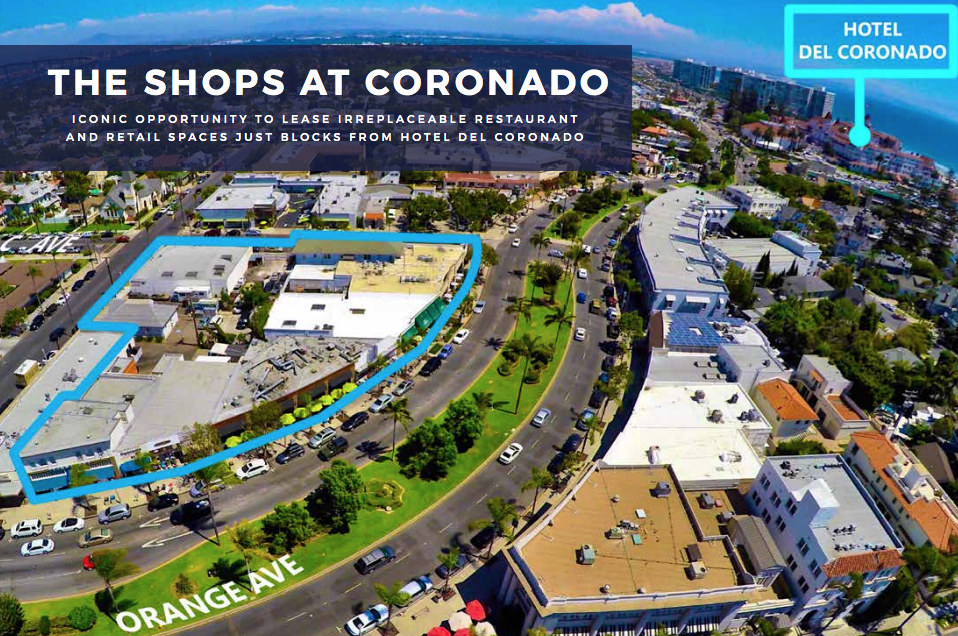One person, Bruce Kleege, now owns nearly a full 30% of the real estate in the downtown commercial heart of Coronado. It is not entirely clear yet what his plans are for it. Kleege has announced that he is evicting the El Cordova Garage and intends to replace it with a restaurant. Other than that, he says he will take it slow to see what happens. The Coronado Times decided to delve a bit further into what Kleege is able to do and what sort of zoning or other restrictions he faces.
When trying to surmise what Kleege might have in mind, one can look to his commercial brokerage firm, Retail Insite. Currently, all of the properties that were part of the sale are listed on the website of Retail Insite, as “The Shops at Coronado.” If that sounds familiar, it might be because you’ve heard of the “Shops at La Jolla Village.” The irony here is that so many Coronadans, in response to the news of the sale and the closing of both Island Surf and El Cordova, have said that they don’t want Coronado to become another La Jolla.
In fact, The Shops at La Jolla Village are just what many residents fear – a mini-mall with formula and big box retailers – Whole Foods, Sprinkles, Nordstrom Rack, SportsClips, to name a few. Upscale – just what a new owner might want in order to earn a return on investment – and non-unique.
 Rock Walton, owner of El Cordova Garage, argues that Kleege is looking to destroy this block of Coronado. While Walton might be fighting for Coronado and not for himself – after all, there is little he can do to fight his eviction – he says that his customers should do all they can to preserve the Coronado community. In particular, he asked everyone to call the one city councilmember whom they know and ask that the City of Coronado take action.
Rock Walton, owner of El Cordova Garage, argues that Kleege is looking to destroy this block of Coronado. While Walton might be fighting for Coronado and not for himself – after all, there is little he can do to fight his eviction – he says that his customers should do all they can to preserve the Coronado community. In particular, he asked everyone to call the one city councilmember whom they know and ask that the City of Coronado take action.
Some in Coronado have already reached out to city leaders. Councilwoman Carrie Downey said, “We have had many people email and call and there is absolutely nothing we can do about changing leaseholders.” Moreover, for those who think that the building is protected by historic preservation rules, it’s not. Downey said, “What I have told several people … is that we do have a historic resource statute which requires historical review for demolition if a residence is 75 years old or older. However, we have not extended that to commercial buildings (although there are commercial buildings which have chosen to do it voluntarily such as the Spreckels Building and the Library).” Even if the City Council did choose to consider applying it to commercial buildings, it would not help Rock Walton keep his lease; because, first, it would only halt demolition (not the removal of a leaseholder) and, second, according to the Coronado Historical Association, the El Cordova building is 71 years old.

Apparently, the only real constraints that Kleege will face will be those related to The Orange Avenue Corridor Specific Plan (The Plan) and any constraints the community can manage to hold him to.
According to the Plan, “The true core of Coronado’s retail market lies in the area between Tenth St. and the Hotel Del Coronado. This area is characterized by a curving streetscape accented by unique architecture with historic character. Small retail centers, totaling more than 94,000 square feet (SF) of retail space [of which the Kleege purchase represents nearly 30,000 sf], are located on Orange Avenue between the southern terminus of C Avenue and the Hotel Del Coronado.”
The Plan was taken up in 2002 to address a number of particular issues that are relevant now with Kleege’s purchase and expected changes, including: concern about the downtown “evolving into a tourist-serving district, and the desire for expanded retail opportunities for residents, availability of convenient parking … ability of local businesses to compete with corporate establishments … prospect of increasing traffic volumes.”
How much does the plan really constrain Kleege? Surprisingly, probably not that much.
First, let’s start with off-street parking. The primary constraint that businesses have traditionally faced from the Plan is the requirement that off-street parking be added for newly-created eating establishments. The Plan, generally, requires one parking space per 100 sf of floor area. This is why, out of all of the establishments Kleege purchased, the El Cordova Garage looks easiest for transforming into a restaurant – it should have enough land to create the necessary parking spots. However, Kleege has talked about taking half of the space for retail establishments, half for the restaurant and recreating a courtyard out of the area where cars are currently stored. Can he do everything he wants? Maybe. Since Kleege also owns other buildings nearby, such as the Eagle & Journal, where he could theoretically use shared parking, he might be able to get away with creating fewer new parking spots than an individual building owner would have to.
 Moreover, Kleege has hinted at the possibility of replacing Costa Azul with another restaurant. Since there would be no change from retail to restaurant in this case, there would be no need to add parking spots.
Moreover, Kleege has hinted at the possibility of replacing Costa Azul with another restaurant. Since there would be no change from retail to restaurant in this case, there would be no need to add parking spots.
Second, another concern that Coronadans have is that the new owner might bring in formula retail or formula fast food. While we generally think of those as unlikely to be brought in, the Plan does not prohibit them, rather it requires acquisition of a Special Use Permit.
So, if Kleege wanted to put in formula fast food joint, it would be required to have a minimum of ten parking spaces, could not have a drive-through, could not be on a corner (unless there was one previously in that spot) nor located where there is already one or more operating on the site.
Similarly, formula retail is not prohibited. It is simply managed and requires a Special Use Permit. Fundamentally, the Plan attempts to “regulate the location and operation of formula business establishments in order to maintain the City’s unique village character, the diversity and vitality of the community’s commercial districts and the quality of life of Coronado residents.” If Kleege wants to put in a LuluLemon, for instance, where Island Surf used to be, it seems that he most likely would be able to (assuming that Coronado would fit into LuluLemon’s formula). As Rachel Hurst, the Director of Community Development for the City pointed out, “It’s amazing what you can do when you just follow the rules. Walgreens applied, it conformed to the rules, and it was permitted to open.”
It seems Kleege will have broad latitude from the Plan in deciding what to do with his properties. It also seems likely that he will want to make money. As one business owner said to me, “Can you even imagine the payments on a $22 million dollar mortgage?” There is also the tax bill, which will now be significantly higher than what the prior owners received.
That leaves the constraint the community can place on Kleege. As one commenter, Dave Fenner, said in response to the article on The Coronado Times website about a restaurant replacing the El Cordova Garage, “I’d be very willing to stop and have lunch there now, at Cordova’s, but will not set foot in it if it changes from the wonderful classic auto repair that it is.”
It’s hard to imagine, though, that if a really tasty eatery takes over the space, that Coronadans will hold out for long en masse. In fact, many have expressed excitement at the idea of a new restaurant; and, others might well be excited about a new, higher end retail establishment in one of the spots.
At this point, the most likely scenario for affecting change will be the long-haul task of asking the City Council to reconsider the Plan and to ask for further changes regarding historical buildings. That wouldn’t change anything today, but it could help prepare Coronado for when the next big buyer comes along.





